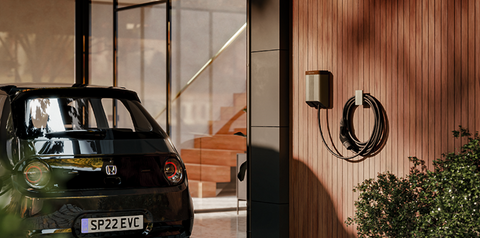Hey there, eco-conscious friends! Deciding on the perfect EV charger for your home can be a blast, especially when you're armed with the right info. So, buckle up as we journey into the world of tethered and untethered chargers, exploring their differences, as well as their pros and cons. Together, we'll help you find the perfect charging buddy for your electric vehicle. Are you ready? Let's get charged up!

Tethered EV Chargers
Picture this: your very own "green" petrol station pump at home - that's the tethered charger experience! With an attached charging cable, these chargers come with a set manufacturer's cable length, and they're compatible with all charging types, including Type 1 and Type 2 connectors. Intrigued? Let's have a look at the bright side and the not-so-bright side of tethered chargers.

| Type 1 Tethered EV Cable |
Tethered Charger Pros
All-in-one price
One reason our customers adore tethered chargers is the all-in-one package - the charging cable is included in the purchase price, making it a complete charging solution without extra costs. And who doesn't love a sweet deal?
Convenience
With a tethered charger, you can forget about lugging around a separate charging cable since it's always attached to the charger. Just plug your car in, and you're good to go - easy peasy, lemon squeezy!
Minimised risk of theft
Safety first! Since the charging cable is permanently attached to the charger, there's a lower risk of theft compared to untethered chargers, where the cable is separate and more accessible to potential thieves.
Tethered Charger Cons
Limited to Type 1/2 connectors
Tethered chargers do have their limitations. They're usually designed for either Type 1 or Type 2 connectors, which means you may need to upgrade your charger if you switch to a different EV model that uses a different connector type.
Can be bulky
Size matters, and tethered chargers can be a bit on the bulky side due to the attached cable. Keep this in mind if you have limited space in your garage or parking area.
Requires a cable tidier
To keep your tethered charger neat and organised, you'll need to invest in a cable tidier to store the cable when not in use. After all, a clean and tidy charging station is a happy charging station!
Untethered Electric Car Chargers
Untethered chargers are the chameleons of the EV charging world. They don't come with a built-in charging cable, so you'll need to purchase a separate cable that's compatible with your vehicle's charging port. This flexibility allows you to easily switch between different cables for various EV models.

Untethered Charger Pros
Versatility
Untethered chargers offer flexibility, as you can use different charging cables to accommodate various EV models. If you own multiple electric vehicles with different connectors or plan to upgrade your EV in the future, an untethered charger can be your versatile companion.
Easier cable management
Without a permanently attached cable, untethered chargers tend to be sleeker and easier to manage in terms of space. Simply unplug the cable and store it away when not in use, maintaining a clutter-free charging area.
Cable length options
When you purchase a separate charging cable, you can choose the length that best suits your needs. This allows for greater customisation and convenience, ensuring your cable reaches your EV comfortably. Increasing your cable length also doesn’t require an electrician, as is needed for tethered cables.
Untethered Charger Cons
Separate cable purchase
The main downside of untethered chargers is the need to buy a separate charging cable. While this provides flexibility, it also means an additional expense. Plus, you'll need to remember to bring the cable with you when charging away from home.
Potential theft risk
Since the charging cable is separate from the charger, there is a slightly higher risk of theft. To minimise this risk, consider storing the cable securely when not in use.
Cable compatibility
With an untethered charger, you'll need to ensure the charging cable you purchase is compatible with your vehicle's charging port. While this may require a bit more research, it's a small price to pay for the added flexibility.
Conclusion
So, tethered or untethered? The choice is yours! Both options have their perks and drawbacks, but ultimately, it's about what best fits your lifestyle and charging needs. Remember, our friendly and knowledgeable EV Cables team is always here to help you make an informed decision. Feel free to reach out with any questions, and together, we'll find the perfect charging solution for your electric vehicle adventure.





Leave a comment
All comments are moderated before being published.
This site is protected by hCaptcha and the hCaptcha Privacy Policy and Terms of Service apply.